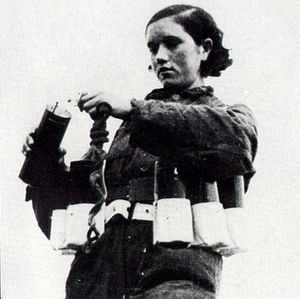Rosario Sánchez Mora facts for kids
Quick facts for kids
Rosario Sánchez Mora
|
|
|---|---|

Sánchez Mora while preparing the dynamite
|
|
| Nickname(s) | La Dinamitera |
| Born | 21 April 1919 Villarejo de Salvanés, Spain |
| Died | 17 April 2008 (aged 88) Madrid, Spain |
| Allegiance | |
| Service/ |
|
| Years of service | 1936–1939 |
| Battles/wars | Spanish Civil War |
| Spouse(s) | Paco Burcet |
| Children | 1 |
Rosario Sánchez Mora (born April 21, 1919 – died April 17, 2008) was a brave Spanish woman. She was known for her role in the Spanish Civil War. People called her la Dinamitera, which means "the Dynamiter". This was because she was very skilled with explosives. She became a hero for the Republicans during the war.
Contents
Early Life and Moving to Madrid
Rosario was born in a town called Villarejo de Salvanés in Spain. Her father was a mechanic. Sadly, her mother passed away before the Civil War began. When Rosario was 16, she moved to Madrid. There, she started working as a seamstress, making clothes.
Rosario Sánchez Mora in the Spanish Civil War
When the Spanish Civil War started in 1936, Rosario was only 17 years old. She was one of the first women to join the militias (groups of armed citizens). These groups fought against the Nationalist forces. The Nationalists were led by General Francisco Franco.
Joining the Fight and Earning a Nickname
Rosario joined the Republicans on July 17, 1936. This was the same day the Spanish Army rebelled against the government. She was one of the few women fighting on the front lines. Her job was to help defend Madrid. She was the only woman in the group that handled dynamite. This is how she got her famous nickname, La Dinamitera.
An Injury and a Visit
Just two months into the war, Rosario was making explosives in the trenches. Her right hand was badly injured and blown off. While she was recovering in the hospital, a famous Spanish philosopher named José Ortega y Gasset visited her.
New Roles During the War
After she recovered, Rosario took on new roles. First, she worked as a telephonist at military headquarters. In 1937, the Spanish government asked all women to leave the front lines. So, Rosario became a postwoman. Every morning, a driver would take her to the front lines. She delivered mail between the Republican soldiers and their families.
Rosario kept helping the Republicans in other ways too. She worked with Dolores Ibárruri, a leader known as "La Pasionaria". They helped recruit women to take jobs that men had left to go fight. In 1937, Rosario married a Republican sergeant named Paco Burcet. They had a daughter together. Soon after, Paco went to fight in Teruel. They lost touch for the rest of the war.
The End of the War and Capture
In 1939, the Nationalist forces surrounded Madrid. Before the city fell, Rosario hid her rifles. She also burned any papers that linked her to the Republican side. She left her baby daughter with relatives. Then, she went to Valencia, Spain, where the Republican government had moved. She hoped to join her father there. Later, they both fled to Alicante. They hoped to find ships to take them to safety. But the ships never arrived, and both Rosario and her father were captured. Sadly, her father was executed.
Life After the War in Francoist Spain
The victorious Francoist government sentenced Rosario to death. But her sentence was changed to thirty years in prison. She ended up serving three years. She was released in March 1942.
Rosario tried to find her husband, Paco Burcet. She learned that the new government had cancelled all Republican marriages. Paco had remarried and had two sons. This meant Rosario was a single mother with a young daughter. She later had a second daughter.
To support her family, Rosario opened a cigarette stall in Madrid. She worked there until she retired. After Franco's death, Rosario began to share her war experiences. She spoke about what it was like to be a woman fighting in the war. She said it was "the opportunity to fight when women didn't fight. They stayed at home. [She] lost [her] hand. It didn't matter. [She] was prepared to lose [her] life."
Later Life and Recognition
When Rosario was in her eighties, she was officially recognized. She was called a mutilada de guerra, which means "war wounded". This was for the injuries she got during the Spanish Civil War.
Rosario Sánchez Mora passed away on April 17, 2008, in Madrid. She was 88 years old.
A Poem for Rosario
Miguel Hernández, a Spanish Republican poet, wrote a poem in Rosario's honor. He wrote it during the Spanish Civil War. He died in prison in 1942.
Rosario, dinamitera,
the dynamite watched over your pretty hand
envying its fiery attributes . . .
The enemy knew well
the hand of this maiden
that is no longer a hand, because
without moving a single finger
it ignited the dynamite
and made her a star
See also
 In Spanish: Rosario Sánchez Mora para niños
In Spanish: Rosario Sánchez Mora para niños
 | Madam C. J. Walker |
 | Janet Emerson Bashen |
 | Annie Turnbo Malone |
 | Maggie L. Walker |

